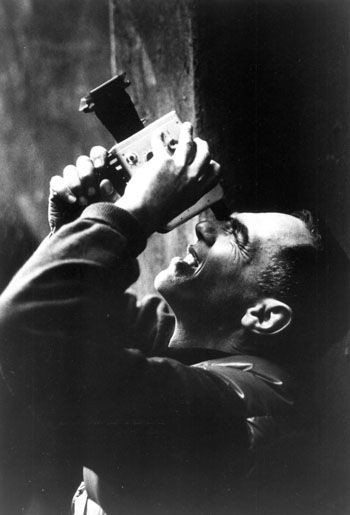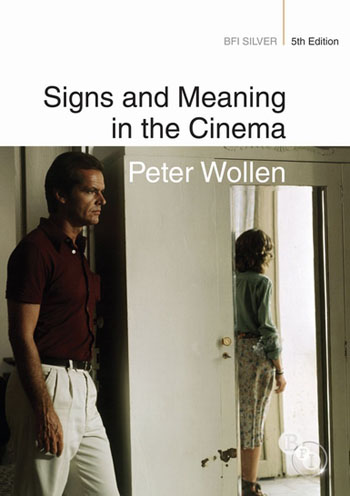The new Summer 2013 issue of Cineaste is out, and while very little of the print issue is online, the magazine’s posted a good handful of “Web Exclusives” and “previews” of a few major features. Jonathan Murray on Derek Jarman, for example: “The question of what to do with (and about) history lies at the very heart of this filmmaker’s art. That conundrum also confronts any attempt to (re)engage with Jarman’s cinema two decades on from the director’s passing.” Lesley Coffin‘s introduction to a critical symposium on the “Art and Craft of Film Biography” will likely tempt many a nonsubscriber to hunt down this issue. And Robert Koehler introduces his print-only interview with Carlos Reygadas.
What’ll surely be the most popular of the “Web Exclusives” is the second installment of Cineaste‘s survey of film critics under 35. This time around: Aaron Cutler, Evgeny Gusyatinskiy, Eric Kohn, Violeta Kovacsics, Adam Nayman, Michal Oleszczyk, Nick Pinkerton, John Semley, Ignatiy Vishnevetsky, and Genevieve Yue. Great stuff, obviously. At the same time, the New York Times‘ A.O. Scott launched a mini-thread on Twitter yesterday with this sobering note:
Cineaste next-gen critics list–2 women out of 15 entries–is either short-sighted or symptomatic. Sad either way. bit.ly/13FxMee
— a. o. scott (@aoscott) June 5, 2013
And there’s more. “With the release of five of Frank Capra’s earliest sound films, his reputation as an idealistic American populist most definitely needs revision,” argues Catherine Russell. Christopher Sharrett suggests that Bruno Dumont, “widely respected in France, is ignored primarily due to the anti-intellectualism pervading current U.S. film culture,” a fingernails-on-chalkboard argument I’m sure Dumont himself would endorse. Dan Georgakas and Dan Bessie briefly discuss Malik Bendjelloul‘s Searching for Sugar Man. Thomas Doherty reviews Kino’s release of King: A Filmed Record… Montgomery to Memphis. Plus: Leonard Quart on Jean Renoir’s This Land Is Mine (1943), Stuart Liebman on Marek Haltof’s book Polish Film and the Holocaust: Politics and Memory, Richard Porton‘s report from Rotterdam, and Cynthia Lucia‘s from the Thessaloniki Documentary Film Festival.
More reading. Catherine Grant points us to the new issue of NECSUS with its special section on “Greenness,” featuring essays ranging “from sustainable media production to the use of the color green in a variety of films.”
“When, in 2010, Sight & Sound magazine polled critics for the best books ever written about the cinema, Peter Wollen’s Signs and Meaning in the Cinema cropped up repeatedly on ballot sheets, 40 years after it appeared in its first edition,” notes Sam Wrigley, introducing, on the occasion of the new publication of the fifth edition, “extracts from an interview conducted in 1997 between Wollen and ‘Lee Russell’—a pseudonym that Wollen used for his writing in New Left Review.”
In the Los Angeles Review of Books, four Fitzgerald scholars address Baz Luhrmann’s The Great Gatsby, while Cornel Bonca argues that the adaptation “works” and Jillian Goodman considers Fitzgerald’s years in Hollywood.
Port Magazine‘s posted Lynn Hirschberg‘s interview with Paul Thomas Anderson.
For Filmmaker, David Barker talks with Walter Murch about how translating the work of Italian writer Curzio Malaparte has influenced his own editing. Barker notes that Malaparte’s novels Kaputt (1944) and The Skin (1949) “mix journalism and fiction and are marked by a disturbing use of surreal images (he was an influence on the magical realism of Colombian writer Gabriel García Márquez). Although also a film director (his one feature, The Forbidden Christ, won a prize at the 1951 Berlin Film Festival), he is best known to film audiences for the home he designed for himself on the island of Capri, which featured prominently in Jean-Luc Godard’s film 1963 film Contempt, starring Brigitte Bardot, Michel Piccoli and Jack Palance.”
A tumblr dedicated to the work of Akira Kurosawa posts an anecdote related by Audie Bock involving the director’s trip to California in 1978. Key players: Francis Ford Coppola’s limousine, Wim Wenders, and Les Blank.
“Christian von Borries is known as a conductor and deconstructor of classical music,” writes Thomas Hübener in the new frieze d/e. “Since 2010, Von Borries has also been making films. He shows them at minor festivals and—as a firm opponent of copyright—makes them available for free via streaming platforms. It’s hard to know what to call them: documentaries? Audiovisual anti-capitalist manifestoes? Potpourris of pop, poetry and politics? Maybe all of these things. Plus, as a vital ingredient, the all-important touch of strangeness, or madness.”
In other news. Nuri Bilge Ceylan and Fatih Akin are part of a group of Turkish filmmakers, artists, and writers signing on to a statement condemning “the censoring attitude of the mainstream media towards the Gezi Park resistance!” Related reading: Çağlar Keyder (London Review of Books) and Orhan Pamuk (New Yorker).
“The Defense Department Inspector General’s office has been sitting on a report that former Defense Secretary Leon Panetta disclosed ‘TOP SECRET’ information and other sensitive details two years ago at an event attended by a ‘Hollywood executive’ working on the movie Zero Dark Thirty,” report Adam Zagorin and David Hilzenrath for POGO. For the Atlantic Wire, Philip Bump explains that the “most significant finding revolves around an event at the CIA held on June 24, 2011, intended to celebrate the success of the raid. At that event, which [screenwriter Mark] Boal attended, Panetta identified both the Navy SEAL team that conducted the raid and its commanding officer—both points of information that were, at the time, classified…. Panetta was excited about the idea of the movie; as the report notes (and as has been reported previously), he hoped he’d be played in the movie by Al Pacino. (He had to settle for James Galdofini.)” More on all this from David S. Cloud in the Los Angeles Times.
“Sundance Institute has established the Roger Ebert Scholarship for Film Criticism to support passionate and aspiring young film critics.”
New York. To follow up on yesterday’s roundup on Allan Dwan, the dossier and the retrospective, Richard Brody‘s posted an entry at the New Yorker arguing that “it’s worth getting at the nature of Dwan’s art while looking also at the underlying implications of seeing ‘art’ in the bosom of Hollywood’s blatantly mercantile productions.”
Open Roads: New Italian Cinema 2013 runs from today through Wednesday and, previewing the series for the Voice, Michael Atkinson focuses first on Marco Tullio Giordana’s Piazza Fontana, “a darkling slice of history originally titled Story of a Massacre. One of the best and creepiest political espionage reportage-thrillers since Costa-Gavras‘s Z, Giordana’s movie tracks the revolutionary tumult in 1969 Italy as authorities try to handle terrorist threats from communist, anarchist, andneo-fascist rebel brigades, leading to and spiraling out from the Piazza Fontana bank bombing.”
San Francisco. New Filipino Cinema 2013, a followup to last year’s successful inaugural edition, is on at the Yerba Buena Center for the Arts through Sunday. At the Evening Class, Michael Guillén interviews programmer Joel Shepard and reviews Adolfo Alix Jr.‘s Kalayaan (Wildlife, 2012).
Los Angeles. The King of Stop-Motion: Ray Harryhausen Remembered opens tonight at the Aero Theatre and, writing for Criterion’s Current, writer, director, and producer Brock DeShane recalls being “drawn to Harryhausen’s dreamscapes from a young age.”
London. With the 5th Terracotta Far East Film Festival opening today and running through June 15, the Guardian‘s Phil Hoad “noir shot through with cynicism about Indonesian society is… re-emerging as a form in the country’s fast-maturing film scene.” And at Global Queer Cinema, Rosalind Galt previews the “great little strand of LGBT themed films.”
And the Karlovy Vary International Film Festival has announced its lineup for the 48th edition, running from June 28 through July 6.
In the works. “J.J. Abrams’s Bad Robot Prods. has struck a deal with the estate of Rod Serling to develop an event series based on an unproduced screenplay by the renowned scribe and Twilight Zone host,” reports Cynthia Littleton for Variety. “The Stops Along the Way is described as Serling’s final completed work before his death in June 1975 at the age of 50.”
james benning is currently shooting a new film in vienna’s natural history museum.
— Dominik Kamalzadeh (@Domkam) June 6, 2013
Paul Schrader, who’ll be taking The Canyons to Venice when he serves as president of the Horizons jury, tells the Playlist‘s Kevin Jagernauth that he plans to direct The Dying of the Light this winter. Nicolas Winding Refn, originally planned to shoot it, may produce, and told an audience at BAM in 2011 that Dying “was a wonderful, wonderful script about a CIA agent who goes on an existentialistic journey and dies at the end.”
Viewing. Lots of discussion out there about Drew Morton‘s video essay response to Rodney Ascher‘s Room 237:
For news and tips throughout the day every day, follow @KeyframeDaily on Twitter and/or the RSS feed. Get Keyframe Daily in your inbox by signing in at fandor.com/daily.






